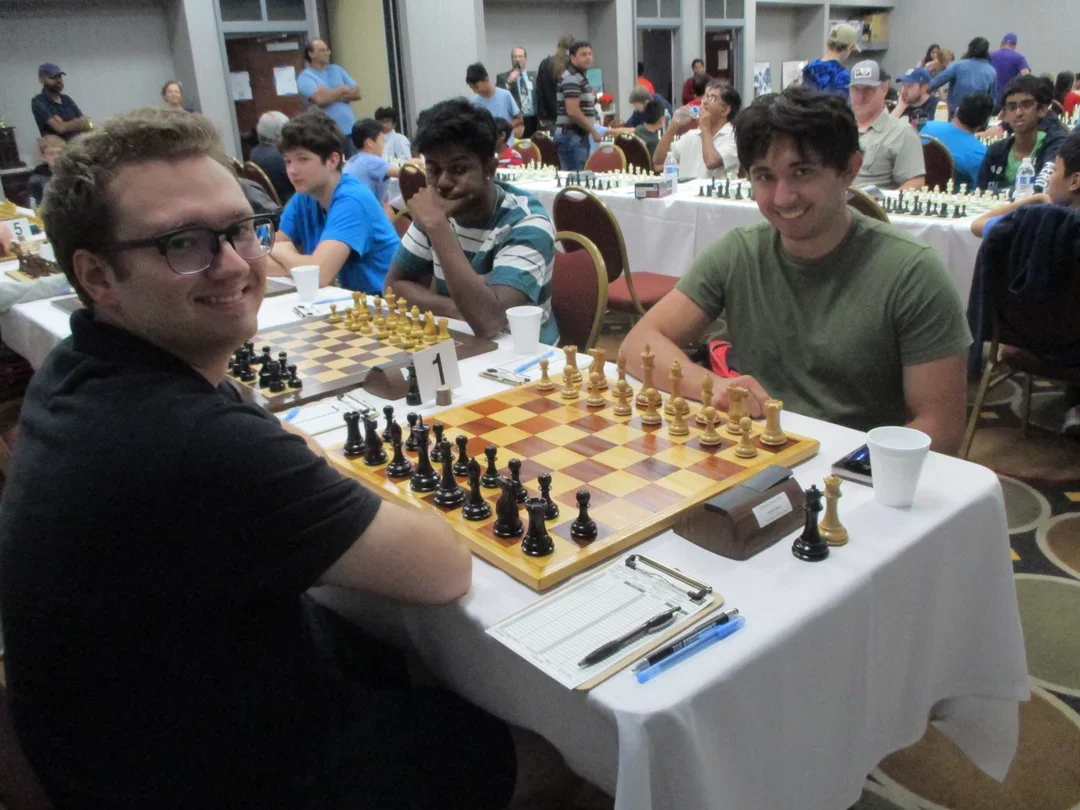Fort Worth, Texas, has several nicknames, including “Cowtown” and “Panther City.” One of its nicknames brings to mind the most powerful piece in chess: “Queen City of the Prairie.” As Alliance is a Fort Worth suburb, the Alliance Chess Club’s biggest annual tournament is the “Queen City of the Prairie Open.”
The tournament is in its seventh year, and I had previously reported on the third edition of this tournament, including some unorthodox decisions about who gets free entry, for Chess Life Online. The tournament determines a Tarrant County Champion and a Fort Worth Champion. Fort Worth is the largest city in Tarrant County. This year, both the county and city titles were won by the same person, Fort Worth resident Brian Tineo, with a 3½/5 score.
All results are available here and information with prizes (except for mixed doubles) can be found here.
Chess Universities
In the overall standings, three players scored “bested” that score, finishing with 4/5 to become co-champions: IM Craig Hilby, IM Zurab Javakhadze, and Andras Horvath. The first two have degrees from The University of Texas at Dallas while Horvath earned a master’s degree in statistics at Texas Tech University.

Like me, CM Tim Steiner works at The University of Texas at Dallas. We won the $200 Mixed Doubles prize, with Steiner scoring 3½/5 (including a win over me in the last round), leaving me with a 2½/5 score.
In the Open, players had a choice of a three-day (July 19, 20, and 21) or a two-day (July 20 and 21) schedule. The time control was G/60+30.
Fastest Win in the West
FM Sharvesh Deviprasath was the top seed in the tournament, with a higher US Chess rating (2540) than Hilby (2491) and Javakhadze (2448). Before round two, Deviprasath mentioned that he had seen the game between my husband, IM Doug Root, and GM Jesse Kraai in the U.S. Senior Championship. I said that Kraai played his first 20 moves of that game in six minutes.

Maybe Deviprasath took Kraai’s speed as inspiration. At the end of his 52-move-long win over Rahul Myala, Deviprasath’s clock showed 1:01.25 (one hour, 1 minute, and 25 seconds). That is, Deviprasath ended with a full minute and 25 seconds more time than he began with. Myala’s clock showed 27 minutes and 23 seconds remaining. Annotations by Alexey Root:
Or perhaps Deviprasath’s speed was inspired by his chess student Amari Cooper, a wide receiver for the Cleveland Browns. Cooper has run the 40-yard dash in under 4.39 seconds. Deviprasath, Cooper, and Cole Blakeman founded the Universal Chess Tour.
Record set
All sections of the Queen City of the Prairie Open participated in the FIDE 100 Guinness World Records setting attempt. That attempt ran from July 20, 2024 00:00:00 CEST (Central European Summer Time) and July 21, 2024 00:00:00 CEST. Because of the time difference between Central Europe and North Central Texas, not every round on July 20th was eligible. Ultimately, 91 games from the Queen City of the Prairie Open counted toward the attempt.
FIDE’s goal was to have the largest number of chess games (both online and offline) played during one day (24 hours). FIDE, the International Chess Federation, succeeded. Carl Saville, Guinness World Records Official Adjudicator, said, “The International Chess Federation has achieved a total score of 5.4 million games played in 24 hours, making it a new GUINNESS WORLD RECORDS title.” This total was later updated to over seven million games.
Last Round
In the fifth and final round, the tournament winners were determined on the top two boards. On board one, a draw between Hilby and Horvath left them both tied for first.
Hilby had drawn Javakhadze in the previous round, while Horvath had won three straight games after drawing William Hao (1807) in round one. Here is the Hilby – Horvath clash, annotated by IM Doug Root and Andras Horvath:
On board two, Deviprasath played Javakhadze, but Deviprasath’s third-round loss to Elbert Fang (who crossed the 2200 US Chess ratings threshold in this event) left him a half-point behind Javakhadze. With their draw, Javakhadze joined Hilby and Horvath atop the standings.
Categories
Archives
- January 2026 (4)
- December 2025 (27)
- November 2025 (29)
- October 2025 (39)
- September 2025 (27)
- August 2025 (29)
- July 2025 (43)
- June 2025 (25)
- May 2025 (24)
- April 2025 (29)
- March 2025 (29)
- February 2025 (20)
- January 2025 (24)
- December 2024 (34)
- November 2024 (18)
- October 2024 (35)
- September 2024 (23)
- August 2024 (27)
- July 2024 (44)
- June 2024 (27)
- May 2024 (31)
- April 2024 (51)
- March 2024 (34)
- February 2024 (25)
- January 2024 (26)
- December 2023 (29)
- November 2023 (26)
- October 2023 (37)
- September 2023 (27)
- August 2023 (37)
- July 2023 (47)
- June 2023 (33)
- May 2023 (37)
- April 2023 (45)
- March 2023 (37)
- February 2023 (28)
- January 2023 (31)
- December 2022 (23)
- November 2022 (32)
- October 2022 (31)
- September 2022 (19)
- August 2022 (39)
- July 2022 (32)
- June 2022 (35)
- May 2022 (21)
- April 2022 (31)
- March 2022 (33)
- February 2022 (21)
- January 2022 (27)
- December 2021 (36)
- November 2021 (34)
- October 2021 (25)
- September 2021 (25)
- August 2021 (41)
- July 2021 (36)
- June 2021 (29)
- May 2021 (29)
- April 2021 (31)
- March 2021 (33)
- February 2021 (28)
- January 2021 (29)
- December 2020 (38)
- November 2020 (40)
- October 2020 (41)
- September 2020 (35)
- August 2020 (38)
- July 2020 (36)
- June 2020 (46)
- May 2020 (42)
- April 2020 (37)
- March 2020 (60)
- February 2020 (38)
- January 2020 (45)
- December 2019 (34)
- November 2019 (35)
- October 2019 (42)
- September 2019 (45)
- August 2019 (56)
- July 2019 (44)
- June 2019 (35)
- May 2019 (40)
- April 2019 (48)
- March 2019 (61)
- February 2019 (39)
- January 2019 (30)
- December 2018 (29)
- November 2018 (51)
- October 2018 (45)
- September 2018 (29)
- August 2018 (49)
- July 2018 (35)
- June 2018 (31)
- May 2018 (39)
- April 2018 (31)
- March 2018 (26)
- February 2018 (33)
- January 2018 (30)
- December 2017 (26)
- November 2017 (24)
- October 2017 (30)
- September 2017 (30)
- August 2017 (31)
- July 2017 (28)
- June 2017 (32)
- May 2017 (26)
- April 2017 (37)
- March 2017 (28)
- February 2017 (30)
- January 2017 (27)
- December 2016 (29)
- November 2016 (24)
- October 2016 (32)
- September 2016 (31)
- August 2016 (27)
- July 2016 (24)
- June 2016 (26)
- May 2016 (19)
- April 2016 (30)
- March 2016 (36)
- February 2016 (28)
- January 2016 (32)
- December 2015 (26)
- November 2015 (23)
- October 2015 (16)
- September 2015 (28)
- August 2015 (28)
- July 2015 (6)
- June 2015 (1)
- May 2015 (2)
- April 2015 (1)
- February 2015 (3)
- January 2015 (1)
- December 2014 (1)
- July 2010 (1)
- October 1991 (1)
- August 1989 (1)
- January 1988 (1)
- December 1983 (1)







